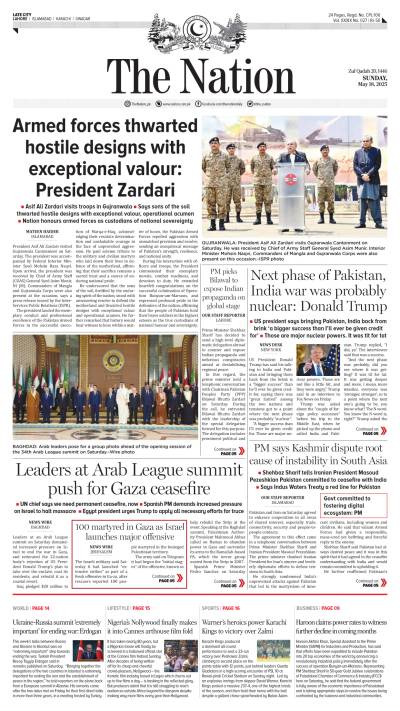Censorship on the internet has become an agonising reality in an economy where the right to free speech is one of the basic rights. Pakistan’s digital realm is an ideal target for restriction and control, from firewalls to VPNs. Going from bad to worse, this development aligns with the use of coercive digital surveillance. President Asif Ali Zardari on Wednesday signed the much-debated amendments to the nation’s cybercrime laws, the Prevention of Electronic Crimes Act (PECA), abandoning increasing criticism amid pleas from the media and journalists to halt the bill.
With the intent to control internet activity in Pakistan, the PECA was first enacted in 2016. However, the act was incorporated by the government to be used as a tool to minimise free speech and dissent. In accordance with the law, the government has expansive authority to arrest and detain anyone who posts content identified as “anti-state” or “offensive.” The law is so ambiguous that it can be interpreted in any way, allowing the authorities to detain and pick up anyone they may find as a threat.
A gloomy example of PECA’s overreach is the case of a WhatsApp group admin who was arrested for reportedly permitting a demeaning remark aimed at Punjab Chief Minister Maryam Nawaz to circulate in the group. The admin, who was unrelated to the offending post, was taken into custody by the police and charged under the Prevention of Electronic Crimes Act 2016. This incident highlights the dangers of PECA and raises important questions about accountability, free speech, and the role of online platforms in monitoring user content. It’s a classic case of guilt by association, where innocent people are punished for the sins of others. PECA’s draconian provisions have created a climate of fear among Pakistan’s online community, where people are hesitant to express themselves freely.
Rather than promoting technological advancements and enhancing the well-being of its people, Pakistan is hindering its progress. The Pakistani government’s attempts to control online content and curb propaganda have led to a series of measures that restrict internet freedom. Blocking Virtual Private Networks (VPNs), which are frequently used to navigate within restrictions on geography and access banned content, is one such approach. However, this has resulted in a cat-and-mouse game between the government and VPN users. A never-ending loop of blocking and unblocking results from users discovering new ways to get over government bans on VPNs.
In June 2023, the Special Investment and Facilitation Council (SIFC) was formed, which is headed by the country’s top military and civilian brass with a single-point agenda of driving Pakistan’s nose-diving economy and structural reforms that have plagued its progress for decades now. The SIFC has five major components, with the second one being Information Technology and Telecom. Pakistan’s IT sector is facing a staggering loss of $300 million due to the government’s imposition of a national firewall, according to estimates by the Pakistan Software Houses Association (P@SHA). The significant financial loss stems from the crippling effects of persistent outages and unreliable VPN connections, which have severely hindered the ability of IT companies to operate efficiently.
These restrictions aren’t merely a nuisance; they have and are still costing individuals their livelihoods. Freelancers, who rely upon platforms like Upwork, Fiverr, and Freelancer to earn a living, are experiencing difficulties in keeping up with work due to slow internet, blocked services, and VPN bans. In an economy where stable jobs are already hard to come by, remote work was a lifeline for many. At this point, that opportunity is slipping away, not because of a lack of talent or effort, but because of a system that makes it impossible to thrive. Rather than becoming an emerging hub for digitally savvy individuals, the country is driving away attractive opportunities. And the result? Reduced revenues, fewer employment opportunities, and an even tougher road for those who used to achieve great things in the online workspace.
Beyond professional restrictions, distance learning, which could have provided a much-needed solution for Pakistan’s already fragile education system, experienced severe disruption when the Government of Punjab (GoP) announced a switch to online classes in November 2024 due to hazardous smog levels. In fact, what could have been an effective alternative quickly became ineffective, as students and teachers struggled with slow internet speeds and constant connectivity issues.
Even for the average person who may not rely on the internet for work or study, the impacts are still felt. For those in remote areas, the inability to access these services can feel isolating and frustrating. Furthermore, small businesses, like local shops or delivery services, also feel the strain, as they rely on the internet to manage sales, communicate with customers, and run errands.
Considering the numerous challenges posed by slow internet and constant restrictions, it’s clear that it’s time for the government to rethink its approach to internet freedom. Instead of tightening its grip on the country’s already controlled digital landscape, the focus should be on establishing free and secure online spaces where people can interact, learn, work, and grow.
Aima Khan
The writer is an educationist and a freelance journalist. Twitter: @aimaimrankhan





